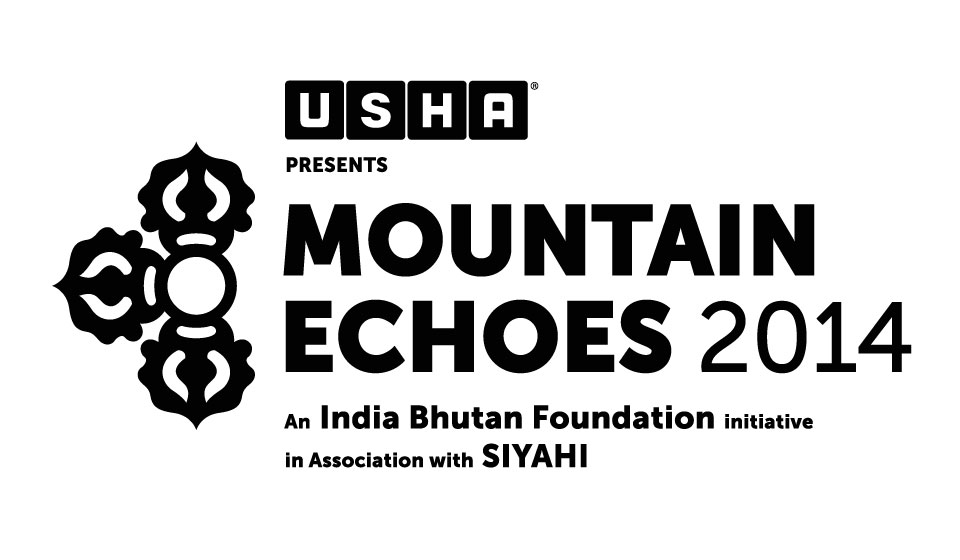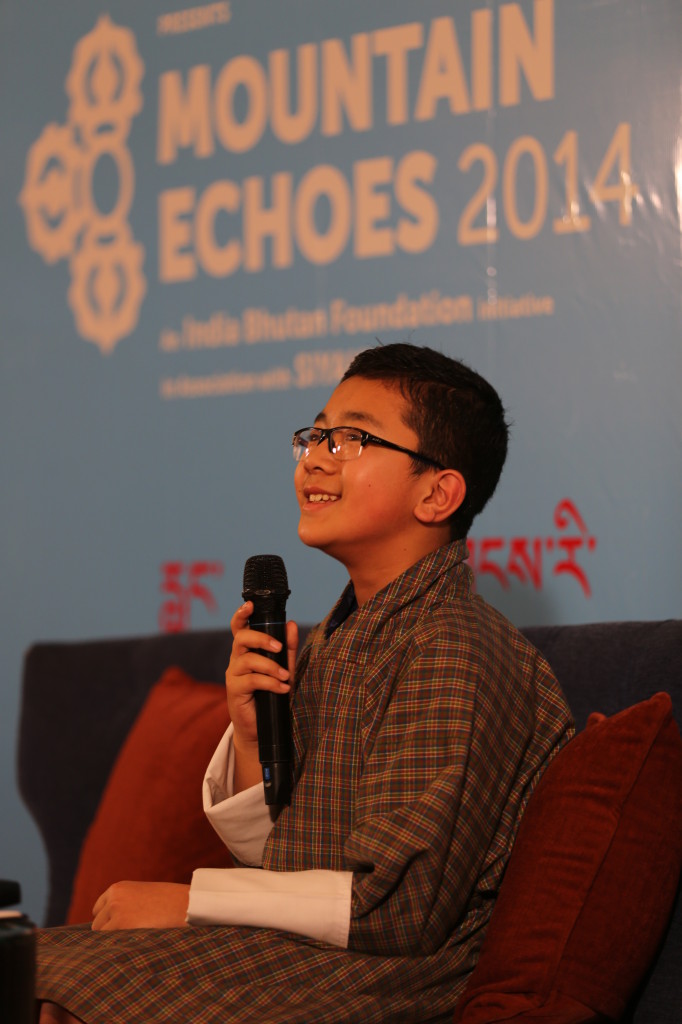Veteran actress Waheeda Rehman’s effortless grace, spunky wit and endless charm lit up Day 2 of the fifth edition of USHA presents Mountain Echoes. “I was always ready to take risks,” Waheeda said, explaining her choice of unconventional roles in the session, Reflecting The Lens – Women In Indian Cinema.
In her freewheeling chat with Arshia Sattar, she talked about how she worked on her terms. When she entered the film industry, they tried to get her to change her name, much like Dilip Kumar and many others had done. Not quite 18 years old, she declared, “They are they and I am me.” She told a delighted audience that the reason she read the book Guide was because Satyajit Ray asked her to read it as he planned to make it a movie. Either way, I felt I was destined to play Rosie (her character in Guide), she added.
Her joie de vivre was infectious and she ended by saying: “Jab tak zinda ho, jiyo (As long as you are alive, live).”
The day started with popular Bhutanese singer Ugyen Panday performing at Tarayana Centre. Accompanied only by an ‘egg’, Ugyen enthralled the audience.
His performance was followed by Dasho Damchu Lhendup and Dr Karma Phuntsho discussing Bhutan’s glorious heritage in the session Hundred Years of Golden Rule. The session, which was in Dzongkha, had Dasho Damchu Lhendup explaining how he discovered a lot about the country as he collected material for his book on Bhutan’s 100 years as a monarchy.
Pilgrimages and The Journey of Folk Literature had Dasho Sangay Wangchug and Lopen Lungtaen Gyatso discussing the tradition of pilgrimages in the Vajrayana Buddhist philosophy. Dasho Sangay Wangchug also made it a point to encourage the youth to contribute to Dzongkha literature.
Pavan K Varma read from his latest book, The New Indian Middle Class. Written as a ‘post-script’ to his book The Great Indian Middle Class, Pavan explained that between his two books, the Indian middle class had undergone revolutionary changes. Even as he said that the middle class had rapidly grown to become a formidable force in India, he advised caution. Unless this group thought, they would become cannon fodder for any demagogue.
Scottish writer Gavin Francis, who turned heads when he walked in wearing a kilt, talked about his extensive travels in the session Sounds of Silence. Talking to Namgay Zam, he talked about his journeys in places that allow for silence and contemplation. He has set foot on all seven continents, from working at a remote research station in Antarctica to wandering the Himalayas. As to why he wrote, he explained that in some way, he wanted to catch the memory, to trap it in amber, to document his travels to places that are fast changing.
From the silence of the poles, the focus shifted to the hustle and bustle of Delhi, seen through the eyes of two very different authors, Malvika Singh and Somnath Batabyal, in the session City Tales held at Taj Tashi. Reading from each other’s books, Malvika said to Somnath, “I saw Delhi go from a village to a city. You are seeing Delhi go from being a small city to a metropolitan city.”
Ancestral Whispers had Ira Pande talking to Kunzang Choden about the challenges of translating her mother’s work. Ira saw new sides of her mother, legendary Hindi writer Shivani, as she read through and translated her stories.
For the longest time, she couldn’t bring herself to write about her mother until her husband told her – You always refer to your mother as a character, so treat her like a character. “This gave me the distance I needed to write about my mother,” Ira said.
The Role of Civil Society had Umesh Anand, Dasho Kinley Dorji, Bernard Imhasly and Siddharth Shriram discussing what exactly civil society was and what its role in a democracy was. Attempting to define civil society, Umesh Anand said that it was a shared pool of ideas in a neutral space apart from other affiliations. Bernard Imhasly added that people should be careful of political systems hijacking civil society movements for their own needs, as was the case in Egypt and Bangladesh. Siddharth Shriram explained, “One of the rules of Civil Society is to celebrate the ordinary man, even if it means going against the ruling elite,” and called for a strong civil society in the young democracy of Bhutan.
Masterchef Kunal Kapur struck an almost philosophical note when he said, “Hunger is the only real feeling that we are born with. When someone satisfies that feeling, it is the greatest bond.” Talking to Alka Pande about everything from biryani to his popular stint as the TV host of Masterchef India and Junior Masterchef India, Kunal displayed his love for food in its myriad forms. In his session, A Chef In Every Home, Kunal told people to pay as much attention to their kitchens as their bedrooms and living rooms. If you make your kitchen an interesting and beautiful place, he added, everyone will want to enter the kitchen and cook.
Living On The Edge was a look at people who live outside mainstream society in Bhutan. Siok Sian Dorji led the discussion with Passang Passu Tshering, Dr. Francoise Pommaret and Marie Veno Thesbjerg. As a teacher and a passionate blogger, Passang works hard to remind his students of their country’s heritage and tries to show them how rural Bhutan lives. Blog your own trumpet was his advice to people who live outside Thimphu. Marie spoke of her time spent with Bhutanese monks and Dr Pommaret spoke of the harsh conditions in which the remote communities in Bhutan lived. She added: “I would be careful not to romanticise village life – it is really tough.” She supported the demand for more roads to rural areas, which would ensure a better quality of life for the people.
The day ended on a positive note with Singye Namgyel, a Class 6-A student of Thimphu Primary School. His essay on Mountain Echoes had so impressed Prime Minister Tshering Tobgay that he read out excerpts at the inaugural dinner of the festival. The solemn 11-year-old impressed the crowd with his clear thinking, his passion for writing and his honesty. Of his visit to Mountain Echoes, he said, “Writing is a big part of my life and to see so many people who have already achieved their goal of being writers was very inspiring.”
Siddharth Shriram, Chairman of the Board, USHA International, said: “It was heartening to see Bhutanese speakers take the stage, especially the Class 6 student who spoke on the importance of Mountain Echoes. After all, the aim of the festival is to inculcate knowledge and encourage curiosity. Of course, the highlight of the day was Waheeda Rehman sharing her on and off screen experiences. Pavan Verma’s take on Indian middle class was interesting, which was followed by Gavin Francis’s resonating landscapes of silence. Malvika Singh’s session brought to life a nostalgic Delhi and Ira Pande’s homage to her mother was moving.”
Relishing Kunal Kapur’s mouthwatering words and praising the work done by teachers in rural Bhutan as evident in the Living On The Edge discussion, Mr. Shriram summed up, “It was enriching to see so many speakers from different walks of life, from diplomats and actors to chefs and students.”
Even as Waheeda Rehman enthralled the audience at Tarayana Centre, Modhurima Sinha and Sathya Saran introduced the movie Guide at Nehru Wangchuck Cultural Centre. Indian Roots of Tibetan Buddhism and Jagriti Express were also screened.
The three workshops were a big hit. Sujeev Shakya talked about having Buddha As A Life Coach to the 100-odd participants and Christopher C Doyle shared business tips in his workshop Gamechanger: Three Leadership Secrets To Transform Your Life.


